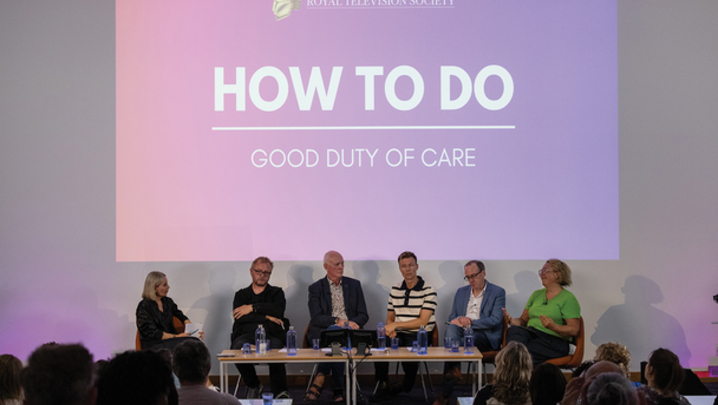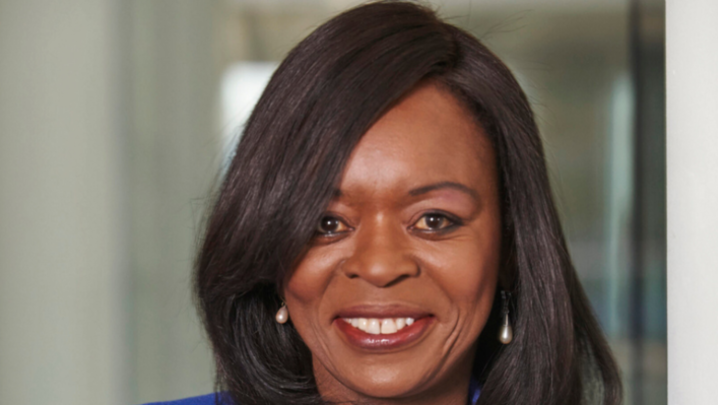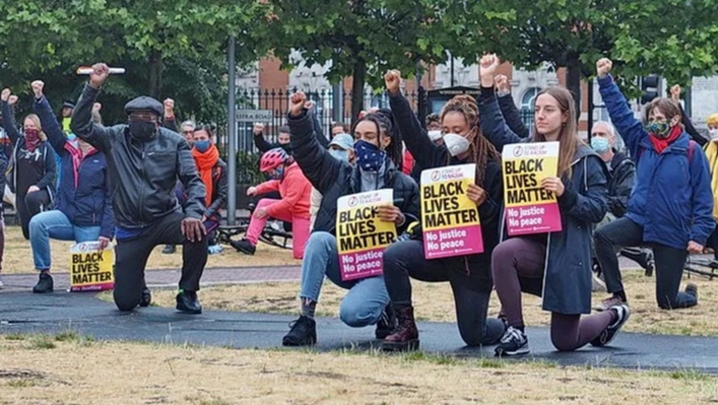Programme-makers who tackle environmental issues are urged to avoid sensationalism, hears the RTS
Television cannot be accused of ignoring the environment. Our destruction of the planet has long been a staple of serious TV documentaries. And in drama, zombies, pandemics and nuclear catastrophe offer stark visions of our future if humanity fails to mend its ways.
According to Richard Curtis, however, environmental programming doesn’t have to be “boring, didactic or terrifying”. The UK’s king of comedy reckoned it can also be “funny, interesting, educational and personal”.
He namechecked a few of his favourite environmental dramas, including 1985 BBC thriller Edge of Darkness, Steven Soderbergh’s biopic Erin Brockovich and Sky Atlantic’s recent drama Chernobyl. But, he added: “The show I’d like to see back is The Good Life, a TV programme about people trying to do the right thing environmentally, and what a struggle and how comical it was.
“There is a sort of ordinariness about the environmental battle, which is there in our day-to-day lives.”
Curtis enjoyed TV success with Blackadder and The Vicar of Dibley before moving into movies and creating huge hits such as Four Weddings and a Funeral and Love Actually. He was speaking at an RTS event that looked at how TV comedy and drama can address environmental issues in a less contrived and sensationalist way. “At every level in our business, domestic and political lives, the environment is a big old theme. I don’t think [a drama] always has to end in a nuclear explosion.
“We should remind ourselves of how wide [environmental] issues are. It’s deforestation, water, plastics, fish, animals, recycling, energy – it doesn’t always have to be a cataclysmic breaking of the ozone layer, as entertaining as that might be.”
Curtis pointed to recent research commissioned by the environmental charity Global Action Plan, of which he is a patron. This shows that more than three-quarters of young people in the UK want to see TV drama address environmental issues.
“We’ve not passed the need to educate because that’s always there… but, in a way, this is the moment for drama to take over,” said Curtis, who was talking to Jeremy Oppenheim, the Chair of Global Action Plan. Also present were Georgia Wagstaff, Bethan Moore, Sophie Marsh, Jack Stanley and Amy Harris, five young film-makers hoping to making environment-themed, entertaining TV drama. They are the finalists in Global Action Plan’s “Flickers of the Future” film competition.
The second half of the RTS event saw environmental journalist and broadcaster Lucy Siegle, of the BBC’s The One Show, chair a discussion on how television can better reflect environmental issues.
“The environmental movement has been stunningly good at telling us, if you want to listen, about the [climate] disaster that is playing out,” said Oppenheim. “Our greatest skill has been to tell this bleak, terrifying future… [But] we’re desperately in need for the creative sector to turn this on its head and tell the stories about a future that we need to build together.”
“Ideas and good storytelling,” are key, said Carnival Films head of production Charlotte Ashby. The UK drama specialist makes The Last Kingdom for Netflix and ITV’s Belgravia.
“Just as the HBO comedy series Six Feet Under broke a taboo in tackling the topic of death, head on and with humour, it will take the right stories in the right hands to make content that tackles [the environment] that audiences want to watch,” argued Ashby. “To tell a positive story of a sustainable future, you need to work hard to find an angle, a source of conflict, drama
or jeopardy.”
One potential solution, she said, was to “tell personal, relatable stories that confront but, at the same time, entertain with irreverence and humour”.
Environmental content in drama and entertainment is thin on the ground. A 2019 report from Bafta’s environmental project Albert, “Subtitles to save the world”, analysed subtitles to assess how well TV covers the environment.
“Across a whole year’s worth of broadcasting content, BBC, ITV, Channel 4 and Sky together mentioned ‘climate change’ 3,000 times, which is the same as ‘urine’ and ‘zombies’,” said Aaron Matthews, Albert’s head of industry sustainability.
The situation is improving: a follow-up report will “show that ‘climate change’ is now talked about four times more than it was the previous year, but that only puts it on a par with ‘discos’ and ‘bikinis’. What does that say about an industry of pubic service broadcasters who talk about bikinis as much as climate change?”
Matthews said that Coronation Street, Emmerdale and EastEnders had all run environmental storylines. “It was also interesting to see climate change running as a theme throughout Michaela Coel’s I May Destroy You. We’re getting there, but there are [only] a handful of instances.”
Siegle asked whether TV shows that addressed environmental issues more positively could reduce viewers’ eco-anxiety. “Mental health and the environmental crisis are interlinked,” said Addy Raja, a film producer and NHS junior doctor. For the younger generation, in particular, he said, “there is a feeling of hopelessness and being disenfranchised” – yet this was a generation that wanted to change things. TV dramas often portrayed “a dark, dystopian future and that... causes eco-anxiety”, he argued.
“I’m seeing evidence of stuff in our shows where [environmental] issues are tackled on a granular, real level,” said Sky Studios director of comedy Jon Mountague, whose recent successes include Brassic. “Comedy, in particular, relies on taking down big targets, and what better target [could you have] than anti-environmentalism?
“Were a show such as The Good Life, or something more overtly around environmental issues, to come around, we would absolutely do it.”
Report by Matthew Bell. ‘Making a drama out of a crisis’ was held on 1 October, and produced by the RTS, IJPR and Global Action Plan.
Flickers of the Future sheds light on alternate worlds
Global Action Plan’s film competition, ‘Flickers of the Future’, asked young film-makers to create a human story of a sustainable future. The five finalists – who came up with some quirky, interesting ideas – will pitch their shows to UK broadcasters.
Georgia Wagstaff has devised Planet B, in which a hapless young man stumbles across a planet-sized secret. Bethan Moore’s Keepers, a romantic comedy set in the near future, revolves around competitive bee keeping.
In Sophie Marsh’s Cross the Line, one woman must work with her alternate self to create a greener future before their worlds disappear. Jack Stanley’s series, Natural Causes, is set in an eco-conscious UK, in which a group of teens try to help their terminally ill friend offset her life by erasing her carbon footprint. Amy Harris’s Cheesed Off foresees a world where animal products, fossil fuels and plastic have been outlawed, and rehabilitation is required for those who still harbour old destructive habits.
Screenwriter Richard Curtis was impressed by the finalists’ imagination. ‘Start as you mean to continue. My funny career has gone from writing short sketches and then using that skill to do a sitcom, and now my films use the same skill,’ he advised.
‘Write what you’re passionate about, rather than what you think you ought to address… look at your own experience and life. The big secret of writing is to write stuff that’s interesting to you and moves you.
‘When I started writing on Not the Nine O’Clock News, we were given a list of things that were funny – British Rail sandwiches, trade unions. I didn’t think any of them were funny, so I wrote what I thought was funny.’







